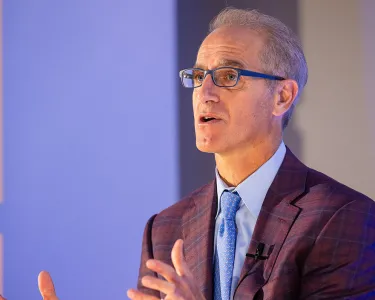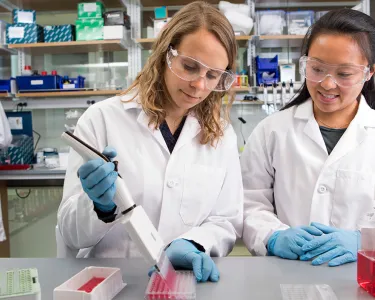The Future of Food
With an institute that integrates food-based nutrition and health care, studies that inform policy, a food-tech innovation hub, and one of the world’s largest research centers dedicated to studying nutrition and healthy aging, Tufts is changing the way we understand the impact of food on health, the economy, and our futures.
Shaping a New Approach to Nutrition for the World

Tufts University’s far-reaching expertise in food and nutrition is shaping U.S. policy, revealing new paths toward better health, helping to secure a sustainable food supply, leading to groundbreaking food-preservation science, uncovering links between nutrition and aging, battling food insecurity around the world—and doing so much more to ensure better, healthier, and more effective food systems.
With two institutes devoted to improving health through food and nutrition—the Food is Medicine Institute and the Food and Nutrition Innovation Institute, both at the Friedman School of Nutrition Science and Policy—and, at the HNRCA, one of the largest centers in the world focused on research at the intersection of nutrition and healthy aging, Tufts is uniquely positioned to help combat hunger, improve healthy eating, and reduce diet-related disease, all goals of the United States’ national strategy for better health by 2030.
The innovative Food is Medicine Institute aims to transform health care through scalable food-based interventions, such as medically tailored meals and prescriptions for produce; nutrition education for doctors; and clinical care, electronic health record, and reimbursement pathways for nutrition-based tools to help treat or prevent diet-related illnesses such as heart disease, some types of diabetes, and certain cancers and complications during pregnancy.
As it long has, research at Tufts continues to inform public policy. As selected examples:
- A Tufts study found that aligning school cafeteria meals to the 2020–2025 Dietary Guidelines for Americans would further support children’s well-being and cut health-care costs into adulthood.
- Tufts researchers have found definitive links between food choices and the majority of Type 2 diabetes cases around the world.
- A study from Friedman School experts found that dollar stores, which typically stock food and beverages lower in nutrients and higher in calories, are the fastest-growing food retailers in the United States, mainly in poor and rural areas.
- Another Friedman School study showed that the 2018 implementation of menu calorie labels in the United States has led to a net decrease in caloric intake by 20 to 60 calories per restaurant meal—enough to prevent at least 28,000 obesity-associated cancer cases and 16,700 cancer deaths over a lifetime. The impact? A combined $2.8 billion savings in net health-care and societal costs.
Meanwhile, the Food and Nutrition Innovation Institute is working to meet the demands of a rapidly changing planet by supporting the development of technology to improve the food supply. Regularly convening a global community of leaders, innovators, and investors to identify the shared challenges facing the future of food, the institute lends interdisciplinary expertise to help build the infrastructure for an economy that sits at the intersection of nutrition and food tech.
Selected Research
Related Centers and Institutes
-
Tufts University Center for Cellular Agriculture
An interdisciplinary center for excellence working to democratize the scientific building blocks of cultivated meat, establish a pipeline of talent and expertise, and foster public trust in this novel technology.
-
Food is Medicine Institute
A university-wide collaborative effort based at the Friedman School of Nutrition Science and Policy, which brings together experts from across disciplines with other local and national collaborators to advance food is medicine research, training, patient care, and community and policy engagement.
-
Food and Nutrition Innovation Institute
The largest academically convened food-systems consortium in the world and an employer of future food system leaders.
-
Jean Mayer USDA Human Nutrition Research Center on Aging
One of the world's largest research centers studying healthy aging and its relationship to nutrition and physical activity, with significant contributions to U.S. and international nutritional and physical activity recommendations, public policy, and clinical health care.









